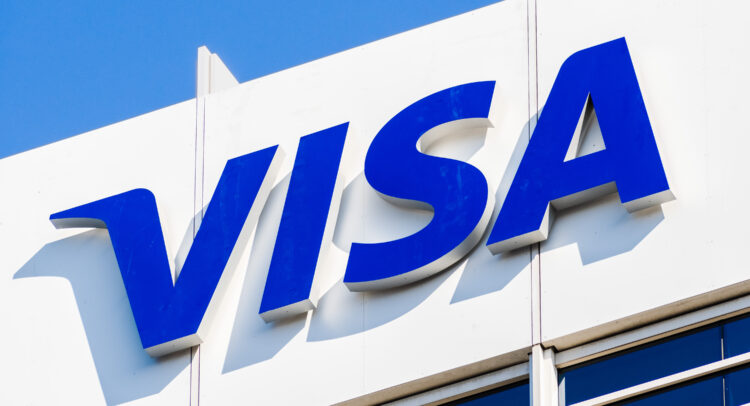Payment services giant Visa (NYSE:V) has experienced a major rally in the last year and a half as consumer spending strength has returned following a pandemic-related slowdown. Still, despite trading near all-time highs, one of the largest payment companies in the world may still have upside potential based on the strength of the economy and the potential for further global expansion. Wall Street analysts are nearly unanimous in assuming a bullish position on V shares, and I join their optimism.
Investors who are leery of Visa because of its pricy shares may still find that it’s not too late to buy in before the economic cycle turns. Below, we look more closely at what sets Visa apart.

Continued Favorable Economic Landscape
As a company heavily tied to economic cycles, Visa tends to thrive in periods of economic growth. Although there has been speculation in recent quarters about a potential recession, so far, many signs have continued to point to a robust economy for the time being. In February, for instance, the U.S. added a better-than-expected 275,000 jobs, while unemployment rose slightly to 3.9%.
JPMorgan Chase (NYSE:JPM) chief U.S. economist Michael Feroli noted last week that “the economy’s momentum early this year has been stronger than we were expecting,” calling for increased economic growth throughout the middle of the year. Analysts now predict an annualized growth rate of 1.8% for the U.S. economy in the first quarter, up from 0.6% projected in January.
Wage growth is also helping drive consumer spending, which, in turn, benefits companies like Visa. Average hourly earnings for February were up 4.3% relative to the same time a year earlier. Although fears of widespread layoffs loomed at the start of 2024, there is little evidence so far to support those concerns.
Visa’s Opportunities for Expansion
Strong economies and better wages drive consumers to spend more (and use their Visa-branded credit and debit cards more), but Visa also has the potential to drive continued growth for itself through expansion as well.
Visa dominates credit card purchase volumes in the U.S. For the first three quarters of 2022, Visa’s share of the market was 52.2%, while Mastercard (NYSE:MA) came in second with just 24.1% of the market share.
There may not be significant room for growth in the U.S., but Visa enjoys a large growth runway in other parts of the world, particularly in the Middle East and North Africa (MENA) region. The company recently launched a partnership with a Jordan-based fintech startup, Numa, aiming to enhance its reach into Saudi Arabia and the UAE.
In December 2022, Visa pledged to invest $1 billion in Africa over a five-year period to drive digital transformation on the continent. We’re still relatively early in this period of accelerated investment. More broadly, Visa’s cross-border volume, excluding transactions within Europe, increased by 16% year-over-year for the first quarter of the company’s 2024 fiscal year. And with almost $14 billion in unrestricted cash and cash equivalents on hand, Visa has the capital to expand broadly and rapidly.
Advantages as a Non-Lender
Investors worried about how Visa might fare in case of a recession might keep in mind that the company does not include lending as a core part of its business, setting it apart from many other financial services and payments firms. This means that the company minimizes its exposure to potential credit delinquencies or loan losses when consumers face a tough economy.
Without these burdens, Visa’s strong capital base does not have to be set aside in case of loan losses, and Visa is free to use it to facilitate continued business even in cooler economies or, as mentioned above, to continue to grow its footprint.
Is Visa Stock a Buy, According to Analysts?
With all of these factors in play, it’s easy to see why Visa enjoys a Strong Buy rating from Wall Street analysts. This is based on 22 Buy ratings, one Hold, and zero Sells. Visa shares have climbed by about 32% in the last year, but with the average V stock price target of $307.32, analysts still see upside potential of 7.5%.

Conclusion: Healthy Spending Makes for Investment Opportunity
As long as consumers remain eager to spend, Visa is likely to benefit. Many signs point to favorable economic factors for consumer spending, and Visa’s unique position as a capital-flush payments company with room to grow into MENA and other regions around the world enhances its appeal, even when the U.S. economy isn’t thriving.









